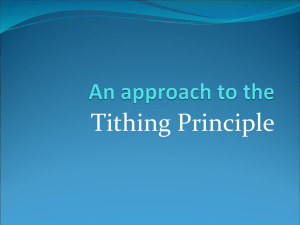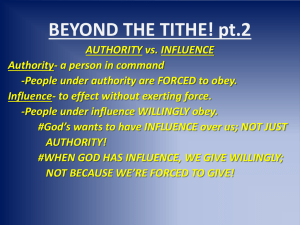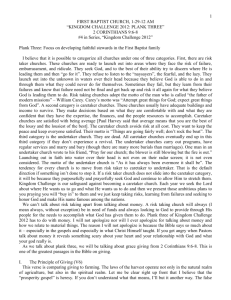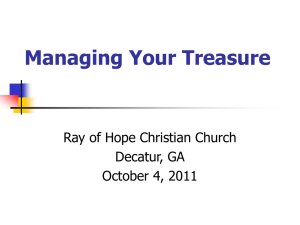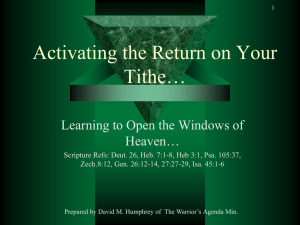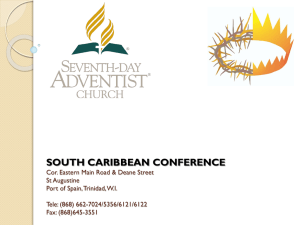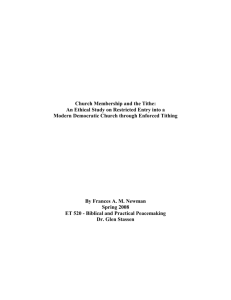It is a pleasure to be in the pulpit today
advertisement
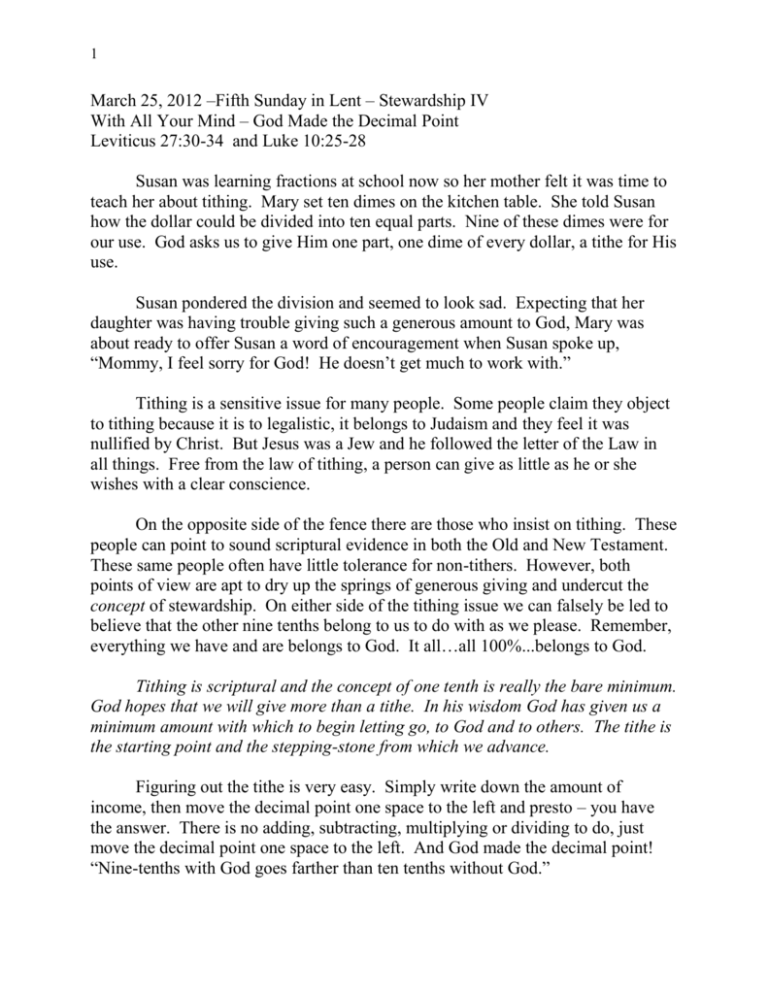
1 March 25, 2012 –Fifth Sunday in Lent – Stewardship IV With All Your Mind – God Made the Decimal Point Leviticus 27:30-34 and Luke 10:25-28 Susan was learning fractions at school now so her mother felt it was time to teach her about tithing. Mary set ten dimes on the kitchen table. She told Susan how the dollar could be divided into ten equal parts. Nine of these dimes were for our use. God asks us to give Him one part, one dime of every dollar, a tithe for His use. Susan pondered the division and seemed to look sad. Expecting that her daughter was having trouble giving such a generous amount to God, Mary was about ready to offer Susan a word of encouragement when Susan spoke up, “Mommy, I feel sorry for God! He doesn’t get much to work with.” Tithing is a sensitive issue for many people. Some people claim they object to tithing because it is to legalistic, it belongs to Judaism and they feel it was nullified by Christ. But Jesus was a Jew and he followed the letter of the Law in all things. Free from the law of tithing, a person can give as little as he or she wishes with a clear conscience. On the opposite side of the fence there are those who insist on tithing. These people can point to sound scriptural evidence in both the Old and New Testament. These same people often have little tolerance for non-tithers. However, both points of view are apt to dry up the springs of generous giving and undercut the concept of stewardship. On either side of the tithing issue we can falsely be led to believe that the other nine tenths belong to us to do with as we please. Remember, everything we have and are belongs to God. It all…all 100%...belongs to God. Tithing is scriptural and the concept of one tenth is really the bare minimum. God hopes that we will give more than a tithe. In his wisdom God has given us a minimum amount with which to begin letting go, to God and to others. The tithe is the starting point and the stepping-stone from which we advance. Figuring out the tithe is very easy. Simply write down the amount of income, then move the decimal point one space to the left and presto – you have the answer. There is no adding, subtracting, multiplying or dividing to do, just move the decimal point one space to the left. And God made the decimal point! “Nine-tenths with God goes farther than ten tenths without God.” 2 Henry Lansdell, a Church of England scholar, wrote a massive work entitled The Sacred Tenth. This work summarizes his research in archeology and history concerning the ancient world. He concluded that most ancient pagan people practiced tithing. One of the greatest buildings in Babylon was a storehouse for the tithes used in heathen worship. In some cases, the Babylonians offered one sixth of their increase to their gods. The ancient Greeks held it a duty to offer a portion of their property to their gods, usually a tenth. The legendary kings of Rome offered a tenth of their spoil to their gods, as did merchants, farmers and soldiers, right up to the time of Christ. As far back as 1300 years before Christ some of the earliest people in Europe gave tenths to their religious leaders. If humankind is basically selfish and sinful where did we learn to tithe? How is it that tithing was so widely practiced, even among the ancient peoples? Is it that humankind was fearful of the vengeance of some god that might be upset if that god didn’t get a fair share? Or could it be that our God revealed it to our ancestors? If God reveals it, then tithing should take its place among other creation ethics such as marriage, Sabbath rest and worship. From the beginning of time God taught the necessity of giving a portion of our increase back to him as a token of His Lordship, in support of his ministry, and as an act of worship. Dr. H. G. Basden offers this humorous insight into tithing today: Now it came to pass at noon one day, that an editor was a guest of a certain rich man. The lunch was enjoyed at a popular restaurant. The waiters were very efficient. The food was good. Now when the end of the meal was at hand, the waiter brought the check unto the host. The host examined it, frowned a bit, but commented not. But as they arose to depart, I observed that he laid some coins under the edge of his plate. I know not what denominations the coins were; how be it, the waiter who stood nearby smiled happily, which being interpreted means the tip was satisfactory. Now this parable entereth, not into the merits of tipping, but as I meditate on the coins that become tips throughout the nations, I begin to think of tips and tithes. For it is now suggested that the proverbial tip be more than a tithe, lest the waiter turn against you. As I continue to think on these things, it appeareth that few people who go to church treat their God as well as their 3 waiter. They give to their waiter a tithe or more, but unto God they give whatever they think will get them by. Verily, doth man fear the waiter more than he feareth God? Doth he love God less than the waiter? Doth the waiter do more for him than God? Mr. Fred Jenkins came into the preacher’s office one day quite upset over his giving. “Pastor,” Fred began in an apologetic tone, “When I was just a teen the scriptures about tithing made a big impression on me. I vowed to God that I would always pay a tithe to the church.” “That is wonderful,” the pastor said in his best supportive tone. “Yes, and when I got my first job delivering papers I tithed. Even in college while working in the kitchen I tithed. It wasn’t much, just a few dollars, but I gave my tithe to the church. After college I married and we bought the store in town. My wife agreed that we should tithe and we did, even though there were times we wondered about making ends meet. Business grew and now there are five stores. With all the income my tithe has increased. My tithe is so large now it is a burden. It just seems like so much to give.” The pastor sat thoughtfully for a moment and then suggested he and Fred pray about the matter. Fred agreed this would be a good idea, for he certainly didn’t know how to break his promise to God about his tithe. The pastor began, “Dear Lord, thank you so much for all the blessings you have given to Fred and his family. You have been gracious indeed. But we come to you today with a concern. Fred is so prosperous he feels his tithe is now a burden. Please decrease his business profits so that his tithe is no longer a burden...." Some early Christian scholars conclude that Cain’s sin consisted in failing to offer a full tithe, or tenth, of his increase. Genesis 4:7 accuses Cain of failing to “rightly divide” implying that Cain failed to portion out the tithe. Perhaps last year he had ten bushels of wheat and gave one, but this year the yield was fifteen bushels and he gave the same one bushel he had the previous year. Hebrews 11:4 refers back to the offering of Able as “a more excellent sacrifice,” or in the proper translation of the Greek word for excellent, “a more abundant sacrifice.” It wasn’t quality, but quantity that got Cain into trouble with God. Although the tenth is not mentioned specifically in the story of Cain and Abel’s offering, specific mention of the tithe is made twice in Genesis. Abraham gave tithes to God’s priestly representative Melchizedek (Mel-ki-ze-deck ).1 After 4 Jacob’s vision of a ladder with angels ascending and descending, he vowed to surely give the Lord a tenth.2 Examination of the Law given to Moses by God indicates that the Israelites gave more than a tenth of their grain; perhaps as much as twenty-five percent.3 The first tithe was called the Levitical Tithe because it was paid to the Levites or priests. In the second tithe, known as the festival tithe, another tenth of the remaining nine-tenths of the first fruits went to sustain the temple services.4 Every third year this temple portion was stored for use in charity to help widows, orphans and strangers.5 Israel was not always faithful in giving the tithe. At other times the tithe was given, but the people’s hearts were not in it.6 Malachi accused the people three times of robbing God through failure to tithe.7 We know that Jesus was raised in a devout Jewish home. His parents went to the temple for blessing when he was two weeks old, according to Jewish law. At the age of accountability, usually 12 or 13, Jesus went with his family to Jerusalem for the annual pilgrimage. In his ministry, Jesus’ accusers heaped many an accusation on him, but never the failure to tithe. Tithing was a serious matter. Jesus accused the Pharisees for neglecting weightier matters of law while foolishly and meticulously paying attention to even tithing the smallest household spices of mint, anise and cumin. But Jesus never suggested the law of tithing was wrong. Acts 21:20 reminds us that the new Jewish Christians were “all zealous for the law.” Tithing was part of this legal heritage inherited as a redeemed people. Paul also instructed the Gentile Corinthian Christians about tithing.8 No testimony of a single bishop in the history of the early church ever condemned or opposed the doctrine of tithe giving, or ever hinted that less than a tenth was the proper proportion to be set aside for God’s service. God has a system. God invented the decimal point from which we tithe or give at least one tenth. We are to give God his tithe and beyond that our gift. God’s tithe and our gift are not one and the same. Our gift does not begin until after we have tithed. Our gift is the portion beyond the tithe. Neither does God act on impulse. As day follows night, and harvest follows the seedtime, so too God operates by law. His methods are not hit or miss. Impulse giving may secure a large sum of money on occasion, but a regular, systematic giving of the tithe over an extended period of time will usually dwarf 5 any impulse gift. For a person to regularly and systematically and cheerfully set aside one dollar in every ten they earn, and give it away to the Lord’s work without inward struggle, strike blow after blow at the root enemy of the human soul – love of money – love of possessions – consumerism as we might call it today. Tithing demands that the giver give now while he or she is alive, not waiting to leave large proceeds in a will or endowment to the church or missionary society. One pastor told a story about a pig that lamented his lack of popularity. Said the pig, “Everybody speaks kindly about the cow, its gentleness and kind eyes. Oh, I admit the cow gives milk and cream, but pigs give more. Why we pigs give bacon, ham, bristles, and people even pickle our feet. Tell me why people don’t appreciate the pig?” A cow standing nearby replied, “Maybe it’s because we cows give while we’re still living.” Wills and endowments are important. We cannot take our money with us and the church certainly can use what isn’t needed for the family. But regular giving supports the daily, mundane routine of ministry from paying the water and light bills and fixing outdated equipment to supporting education and salaries. Regular giving is what makes ministry and programming possible. Regular giving is the lifeblood of financial stability. Without this lifeblood, the hands, feet and voice of the body become weak. Some bodies even succumb to death if the shortfall cannot be replaced. If we sum up tithing it might just sound like this, “Love the Lord your God with all your heart, and with all your soul, and with all your strength, and with all your mind.” Remember this was a series of four stewardship messages; giving to God isn’t just about money. All that we have and are belongs to God. How is your stewardship? (Check time…share personal story if time) Footnotes: 1 Genesis 14:17-20 3 Lev. 27:30-33 5 Deut. 26:12-15 7 Mal. 3:8-10 Genesis 28:22 4 Deut. 14:22-29 6 Amos 4:4 8 I Cor. 16:2 2


